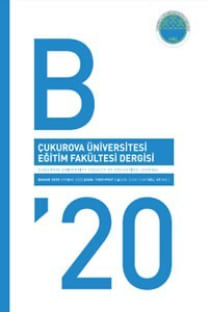The Effect of the Process Approach on Students’ Writing Success: A Meta-Analysis
Process-based writing approach, Turkish language instruction, Writing success, Meta-analysis
___
*Ak, E. (2011). The effect of creative writing techniques on the written expression skills of 5th grade students in Turkish lessons. Master’s Thesis,Dokuz EylulUniversityInstitute of Educational Sciences, İzmir.Arıcı, A. F. (2008). University students’ written expression mistakes. UludagUniversity Journal of Faculty of Education, 21(2), 209-220.
Badger, R., & White, G. (2000). A process genre approach to teaching writing. ELT Journal, 54(2), 153-160. doi: 10.1093/elt/54.2.153
Bangert-Drowns, R. L., Hurley, M. M., & Wilkinson, B. (2004). The effects of school-based writing-to-learn interventions on academic achievement: A meta-analysis. Review of Educational Research, 74(1), 29-58.doi: 10.3102/00346543074001029
*Bayat, N. (2014). The effect of the process writing approach on writing success and anxiety. Educational Sciences: Theory & Practice, 14(3), 1123-1141.doi: 10.12738/estp.2014.3.1720
Begg, C. B., & Mazumdar, M. (1994). Operating characteristics of a rank correlation testfor publication bias. Biometrics, 50, 1088–1101.doi: 10.2307/2533446
*Beydemir, A. (2010). The effect of creative writing approach on writing attitude, creative writing and writing achievement in Turkish classes at fıfth grade in a primary. Master’sThesis, Pamukkale University Institute of Social Sciences, Denizli.
Borenstein, M., Hedges, L. V., Higgins, J. P., & Rothstein, H. R. (2013). Introduction to meta-analysis (S. Dinçer, Trans.). Ankara: Anı.
Boscolo, P. (2009). Writing in primary school. In Charles Bazerman (Ed.), Handbook of research on writing: history, society, school, individual, text (pp. 359-380). NY: LEA, Taylor & Francis.
Cohen, J. (1988). Statistical power analysis for the behavioral sciences (2nd ed.). Hillsdale, NJ: Lawrence Earlbaum Associates.
Coşkun, E., Balcı, A., & Özçakmak, H. (2013). Trends in writing education: An analysis of postgraduate theses written in Turkey. Procedia-Social and Behavioral Sciences, 93, 1526- 1530. doi:10.1016/j.sbspro.2013.10.076
Culham, R. (2003). 6+1 Traits of Writing: The complete guide grades 3 and up. New York: Scholastic.
Cumming, G. (2012). Understanding the new statistics: effect sizes, confidence intervals, and meta-analysis. NY: Routledge.
De Glopper, C. M., & van Kruiningen, J. F., & Hemmen, N. (2014). Context in Writing Process Research: An exploratory analysis of context characteristics in writing process research in educational and workplace settings. Poster session presented at COWR (Conference on Writing Research) of the EARLI (European Associtation for Research on Learning and Instruction), 27-29 August 2014, Amsterdam, Netherlands. doi: 10.3726/978-3-653-02367-1
DeJarnette, N. K. (2008). Effect of the 6+1 trait writing model on student writing achievement.Doctoral Dissertation, Liberty University, Virgina.
Dinçer, S. (2014). Eğitim bilimlerinde uygulamalı meta-analiz. Ankara: Pegem Akademi.
*Doğan, Y., & Müldür, M. (2014). Effect of writing training provided for 7th grade students on the story-writing skills of students. Mersin University Journal of the Faculty of Education, 10(1), 49-65.
Dukpa, L. (1997). Using the writing process model to teach writing at the junior high school level in Durk Yul: An action research. Master’s Thesis. University of New Brunswick, Canada.
Elbir, B., & Yıldız, H. (2012). The evaluation of graduate studies on teaching writing in the primary school. Academic Sight International Refeered Online Journal of Social Sciences, 30, 1-11.
Ellis, P. D. (2010). The essential guide to effect sizes: statistical power, meta-analysis, and the interpretation of research results. London, UK: CUP.
- ISSN: 1302-9967
- Yayın Aralığı: 3
- Başlangıç: 2000
- Yayıncı: Çukurova Üniversitesi Matbaası
Devlet ve Özel Okullarda Çalışan İngilizce Öğretmenlerinin Mesleki Gelişim Üzerine Algıları
Aylin YARDIMCI, M. Pınar BABANOĞLU
Democratic Citizenship Attitude Scale: A Validity and Reliability Study
Cengiz YILDIRIM, Adil TÜRKOĞLU
Öğretmenlerin Bilgi ve İletişim Teknolojileri Becerileri Ölçeği: Güvenirlik ve Geçerlik
Tuncay Yavuz ÖZDEMİR, Yalın Kılıç TÜREL, Filiz VAROL
Turkish State And Private School EFL Teachers’ Perceptions on Professional Development
M. Pınar BABANOĞLU, Aylin YARDIMCI
Meryem ÖZDEMİR YILMAZER, Esra ÖRSDEMİR
